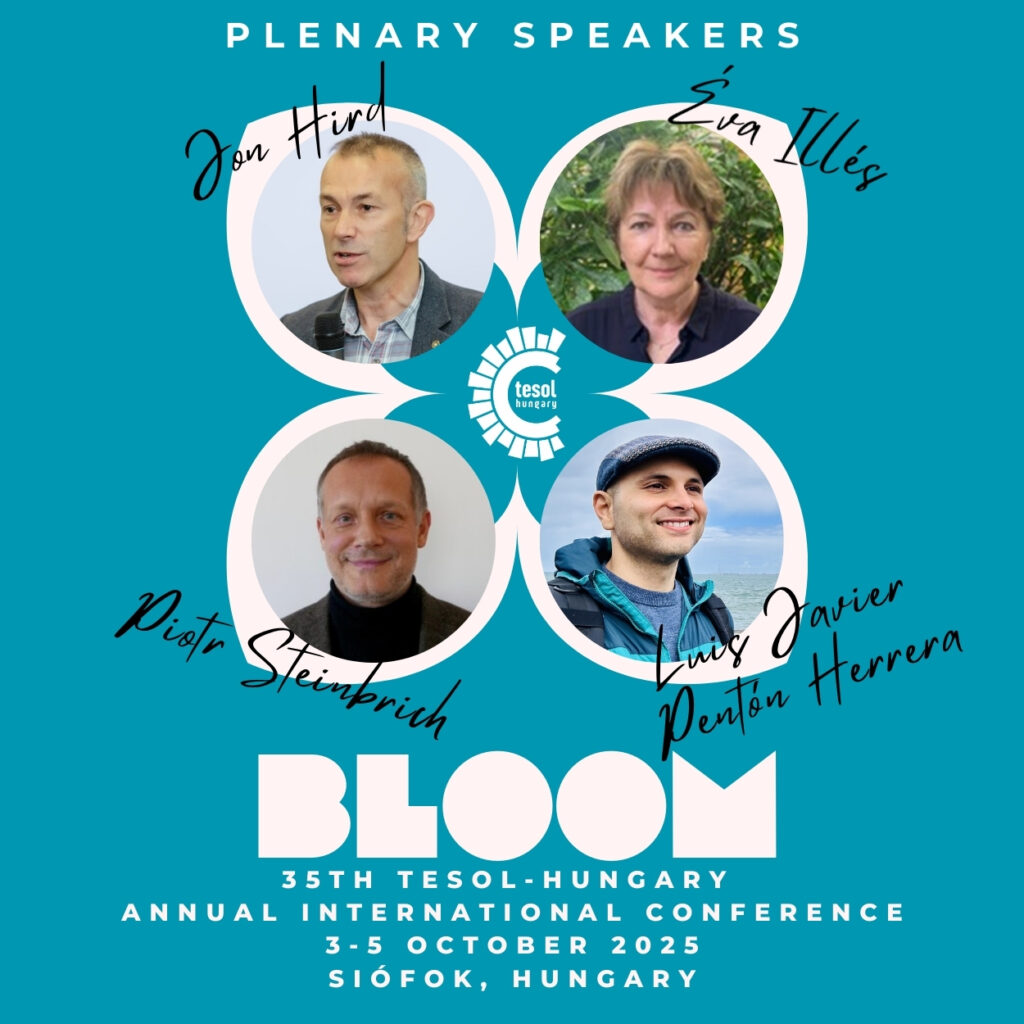What’s blooming on the plenary stage this year?
Take a look at this year’s speakers and check their inspiring sentences!

Introducing: Bringing Spoken Grammar into the Classroom by Jon Hird
![]() The grammar of spoken English is in a number of ways different from the ‘tidy’ ELT grammar that learners are generally taught. In this session, we will first take an overview of some key features of spoken grammar and then through the brief analysis of an authentic dialogue explore how we can, should we wish to, introduce aspects of spoken grammar into our teaching to help our learners better understand and use it.
The grammar of spoken English is in a number of ways different from the ‘tidy’ ELT grammar that learners are generally taught. In this session, we will first take an overview of some key features of spoken grammar and then through the brief analysis of an authentic dialogue explore how we can, should we wish to, introduce aspects of spoken grammar into our teaching to help our learners better understand and use it.
You’ll want a front-row seat for this one.
![]() Get ready for a powerful session at BLOOM Conference by Piotr Steinbrich.
Get ready for a powerful session at BLOOM Conference by Piotr Steinbrich.
![]() Classroom communication made real
Classroom communication made real
![]() Classroom communication, defined as the interaction between teachers and learners or among learners themselves, is a highly specialized form of discourse unique to educational settings. On one hand, learners are constrained by topics chosen by the teacher, who also dictates the format of discussions. Their contributions are expected to be of relatively equal length, and they often express what they believe the teacher expects to hear. On the other hand, teachers tend to focus more on the linguistic form of learners’ responses rather than the content, making their feedback more form-driven than content-driven. In this plenary, I will demonstrate how shifting pedagogic discourse towards a more naturalistic style can significantly benefit learners, creating a more effective learning environment and enhancing the overall classroom dynamics.
Classroom communication, defined as the interaction between teachers and learners or among learners themselves, is a highly specialized form of discourse unique to educational settings. On one hand, learners are constrained by topics chosen by the teacher, who also dictates the format of discussions. Their contributions are expected to be of relatively equal length, and they often express what they believe the teacher expects to hear. On the other hand, teachers tend to focus more on the linguistic form of learners’ responses rather than the content, making their feedback more form-driven than content-driven. In this plenary, I will demonstrate how shifting pedagogic discourse towards a more naturalistic style can significantly benefit learners, creating a more effective learning environment and enhancing the overall classroom dynamics.
This talk will leave you thinking, feeling, and growing. Don’t miss it!
![]() Here’s what to expect from Éva Illés, one of our amazing plenary speakers at BLOOM Conference:
Here’s what to expect from Éva Illés, one of our amazing plenary speakers at BLOOM Conference:
![]() Problems are welcome: Developing problem-solving skills in the age of ELF and AI
Problems are welcome: Developing problem-solving skills in the age of ELF and AI
![]() While English as a lingua franca (ELF) and AI offer benefits, they also pose problems which often require prompt solutions. ELT, therefore, has to create conditions that develop learners’ problem-solving skills.
While English as a lingua franca (ELF) and AI offer benefits, they also pose problems which often require prompt solutions. ELT, therefore, has to create conditions that develop learners’ problem-solving skills.
Since the existing problem-based learning/teaching comprises project work for teaching science, an alternative methodology has to be developed with a corresponding conceptualisation of the notion of problem. Two types of problems are distinguished. One is the well-defined problem with ready-made solutions. Such problems can be found in practice books, where the key gives the correct answers. Although these problems are conducive to learning, they do not prepare learners for the often spontaneously emerging issues ELF and AI present. The type of problem more suitable is the open-ended problem which may occur unplanned and requires the use of all the resources at the teachers’ and students’ disposal.
The talk provides examples of how to exploit open-ended problems in the classroom. The samples come from observations of English and CLIL classes, where teachers not only allowed but also encouraged and utilised students’ queries and challenges. The observations highlight the fact that it is the teacher’s competence, attitude and professionalism that play a key role in the success of students’ learning.
You won’t want to miss this inspiring session in Siófok!
![]() Curious about what’s coming to the BLOOM stage? Here’s a talk you won’t want to miss.
Curious about what’s coming to the BLOOM stage? Here’s a talk you won’t want to miss.
![]() Flourishing together: Situating language teacher well-being and success in English language teaching by Luis Javier Pentón Herrera, Ph.D.
Flourishing together: Situating language teacher well-being and success in English language teaching by Luis Javier Pentón Herrera, Ph.D.
Sometimes a single talk can shift your perspective — and this one just might.
![]() In this keynote, I underscore the vital role of well-being in the professional success and satisfaction of language teachers. I begin by examining the concept of teacher well-being and its impact on pedagogical efficacy and student outcomes. I share insights from recent studies alongside my personal anecdotes to illuminate the pressures we, as language educators, frequently encounter in dynamic and challenging teaching contexts. Moreover, I introduce actionable strategies that promote self-advocacy and resilience, aiming to empower us to not only manage but thrive amidst these challenges. My goal is for all attendees to leave with a renewed appreciation of their critical role as English language teachers and also with knowledge on how to approach advocacy for them and their colleagues.
In this keynote, I underscore the vital role of well-being in the professional success and satisfaction of language teachers. I begin by examining the concept of teacher well-being and its impact on pedagogical efficacy and student outcomes. I share insights from recent studies alongside my personal anecdotes to illuminate the pressures we, as language educators, frequently encounter in dynamic and challenging teaching contexts. Moreover, I introduce actionable strategies that promote self-advocacy and resilience, aiming to empower us to not only manage but thrive amidst these challenges. My goal is for all attendees to leave with a renewed appreciation of their critical role as English language teachers and also with knowledge on how to approach advocacy for them and their colleagues.
Join us in Siófok this October to be part of the conversation.
